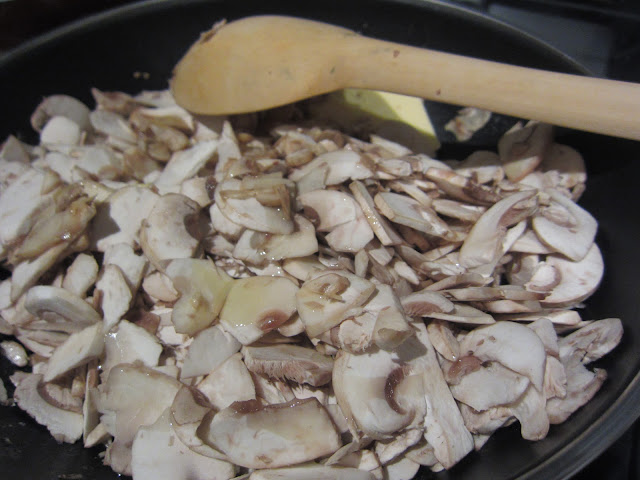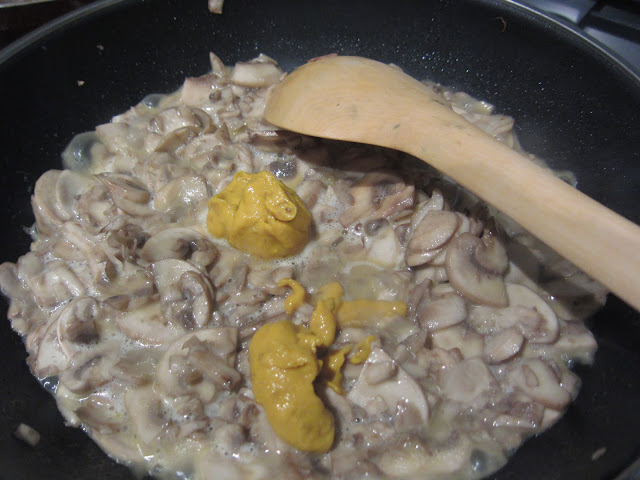 |
| Photo Source |
Saturday, 29 June 2013
DID YOU KNOW...? (70)
Butterflies have tiny receptors on their feet and most butterflies taste the food they are on with their feet.
Wednesday, 26 June 2013
RECIPE: Creamy Mushroom Sauce
Here is a delicious mushroom sauce recipe for you. It may not be the lightest sauce but is sure to become your favourite once you taste it.
Ingredients:
2 medium sized diced chicken breast
Approximately 500gr finely sliced/grated mushrooms
1 tub of cream (500ml)
A generous tablespoonful of mustard (We used a combination of two mustard sauces (Australian and Dijon) in this recipe today. However, you can choose one of your favourite mustard sauces and just use that)
Some crushed garlic to taste (you can omit garlic in this recipe if you like but it enhances the flavour)
50-60g butter
Olive oil
Salt to taste
Method:
First, cook diced chickens well in some oil and salt. If it becomes a bit watery, then pour out the water and keep stirring it until it cooks well. In another pot, melt some butter and cook your garlic in it. Then, add some shredded mushroom to it, add a little bit of olive oil into it and keep stirring until all the mushrooms are nice and soft. After that, add your mustard sauce(s) and cook until you are happy with the thickness of the sauce. If you would like your sauce to be runny, then cook less. Otherwise, keep cooking until the sauce forms the thickness that you like. Once your mushroom mixture is ready, combine it with the chickens cooked earlier and serve this delicious creamy mushroom sauce on top of your choice of pasta. Enjoy!
Note: The photos below show you the images of step-by-step instructions. I took these photos when we were making this sauce for 5 adults and 2 children. You can make it in a smaller size. (We used the whole cream container for this recipe).
Wednesday, 19 June 2013
Guest Post: HEALTH BENEFITS OF GARLIC
When discussing the aromatic personality of garlic, the question remains, would you be willing to smell a little like this potent herb if you knew that it has gobs of health benefits? Many would answer yes when they consider what this miracle food does.
For centuries, garlic has been prized around the globe for its distinct culinary taste and the wonderful flavor it adds to many sophisticated dishes. Additionally, because of its sustainability, garlic has been shipped and traded across long distances.
What's the Magic Behind Garlic
| Photo: Home of Homemade Treasures |
Now scientists from several countries, including France, Italy and the U.S., are confirming the plethora of health benefits gained from garlic, specifically because this herb helps to facilitate detoxification and acts as a powerful antioxidant, stimulating immune responses and reducing inflammation.
Studies are finding that the components in garlic, called Allyl Sulfides and Bioflavonoids, may be key to lowering incidences of heart disease and cancer in those who consume large amounts of it.
Many of our modern-day cancers are thought to be caused by damage to DNA, often induced by environmental toxins. A study conducted at the Fred Hutchinson Cancer Research Center in Seattle found that eating a teaspoon of fresh garlic a day increases the levels of a key enzyme for removing toxins in the blood cells.
Clinical experiments have shown that regular consumption of garlic decreases calcium deposits and the size of arterial plaque in coronary arteries, prevented unhealthy blood clotting and improved the circulation of the subjects who were studied.
What's the Magic Behind Garlic
Garlic produces a chemical called Allicin, which is what seems to make garlic work. Allicin also makes garlic smell. There is a lot of variation among garlic products sold for medicinal purposes. The amount of Allicin, the active ingredient and the source of garlic’s distinctive odor, depends on the method of preparation.
Garlic also has germanium in it. Germanium is an anti-cancer agent, and garlic has more of it than any other herb. In lab tests, mice who were fed garlic showed no cancer development, whereas mice that weren't fed garlic showed at least some. In fact, garlic has been shown to retard tumor growth in human subjects in some parts of the world.
Taking Garlic for Health Reasons
Current research has shown that garlic not only has major impact on cancer prevention, but it also reduces the risk of other major maladies. Not surprisingly the presence of all these antioxidants in garlic have a very positive effect on the immune system in general and can therefore protect the body against all types of bacterial and viral attacks. Allicin has been shown to not only lower blood pressure, insulin and triglyceride levels in laboratory animals fed a sugar rich diet, but also to prevent weight gain.
Garlic is an invaluable medicine for coughs, difficulty of breathing, asthma, hoarseness and other disorders of the lungs because this herb promotes expectoration. The positive effect of garlic on your circulatory system is extremely well documented and it has been proven to decrease platelet aggregation,plus it stimulates the production of nitric oxide in the lining of blood vessel walls, a substance that helps them to relax. As a result, garlic helps to prevent arteriosclerosis and thereby reduces the risk of heart attack and strokes. Finally, because garlic is famous for reducing inflammation, the herb is an excellent natural remedy for those suffering from arthritis.
Garlic is one of the most valuable and versatile foods on the planet. Known as one of the oldest medicinal plants, garlic is a widely recognized health enhancing supplement, and if you can stand the odor, is considered one of the best foods around to promote your well-being.
David Novak is a international syndicated newspaper columnist, appearing in newspapers, magazines, radio and TV around the world. His byline has appeared in GQ, National Geographic, Newsweek, The Wall Street Journal, Reader's Digest, USA Today, among others, and he has appeared on The Today Show, the CBS Morning Show and Paul Harvey Radio. David is a specialist at consumer technology, health and fitness, and he also owns a PR firm and a consulting company where he and his staff focus on these industries. He is a regular contributing editor for Healthline.com. For more information, visit here.
Saturday, 8 June 2013
DID YOU KNOW ...? (69)
 |
| Photo Credit |
Tuesday, 4 June 2013
A CHECKLIST TO HAVE WHILE VISITING SCHOOLS
As I have promised here while telling you about our school search story, I have put together a basic list of questions that you may want to ask or try to have an understanding of when you visit a school. The questions are mostly aimed for primary schools but you can easily adjust them to other schools as well. There are surely many other important factors, such as accessibility and proximity of the school to you, whether the school is co-educational or single-sex school etc, that you will need to take into consideration while looking at school options, but these are only some basic questions (in no particular order) many of which you may want to know the answers of while touring a school. Also, please keep in mind that choosing a school is a personal choice and not every school will work for every child, and one family's key priorities in choosing a school may vary from the others'.
Curriculum:
-Curriculum?
-Extra Curricular activities?
-LOTE (Languages Other Than English)?
-Religious studies?
Class:
-Size?
-Teacher/student ratio?
-Open learning areas/class based (old-fashion these days)/combined classes?
-Use of technology in class?
Special Needs:
-How do they cater for below average kids?
-How do the cater for above average kids?
-Do they/How do they cater for kids with other special needs (eg. language) or disabilities?
Parent Involvement:
-Is parent involvement welcome?
-How can you be involved?
-Who can be involved? (police check done on parents/volunteers that come in contact with students?)
Policies:
-Copies of school policies?
-Homework policy?
-Discipline policy?
-Unacceptable behaviour (eg. bullying) policy?
Library:
-Well maintained?
-Qualified teacher-librarian(s)?
-Books/computers etc?
-Principal's attitude (above questions' answers should give you some ideas on the principal's attitude on the school library and the use of it)?
Student Profile:
-(Cultural, lingual, socio-economical background information may give you an indication of the school culture in general)
Other:
-Are you in the school's current neighbouring zone (if applicable)?
-(If an independent school), scholarship programs, additional costs to the term fees?
-How clean are the buildings/toilets etc? (gives you a feeling of the amount of respect that the school has for their students)
-Does the school accept children with no immunisation (if that is applicable to your child)?
-Does the school accept children with no kindergarten experience (if applicable to your child)?
Please feel free to share your thoughts/experiences and tips on this topic in the comments section below.
Wishing you all the best of luck in your choice!
 |
| Photo Credit |
-Curriculum?
-Extra Curricular activities?
-LOTE (Languages Other Than English)?
-Religious studies?
Class:
-Size?
-Teacher/student ratio?
-Open learning areas/class based (old-fashion these days)/combined classes?
-Use of technology in class?
Special Needs:
-How do they cater for below average kids?
-How do the cater for above average kids?
-Do they/How do they cater for kids with other special needs (eg. language) or disabilities?
Parent Involvement:
-Is parent involvement welcome?
-How can you be involved?
-Who can be involved? (police check done on parents/volunteers that come in contact with students?)
Policies:
-Copies of school policies?
-Homework policy?
-Discipline policy?
-Unacceptable behaviour (eg. bullying) policy?
Library:
-Well maintained?
-Qualified teacher-librarian(s)?
-Books/computers etc?
-Principal's attitude (above questions' answers should give you some ideas on the principal's attitude on the school library and the use of it)?
Student Profile:
-(Cultural, lingual, socio-economical background information may give you an indication of the school culture in general)
Other:
-Are you in the school's current neighbouring zone (if applicable)?
-(If an independent school), scholarship programs, additional costs to the term fees?
-How clean are the buildings/toilets etc? (gives you a feeling of the amount of respect that the school has for their students)
-Does the school accept children with no immunisation (if that is applicable to your child)?
-Does the school accept children with no kindergarten experience (if applicable to your child)?
Please feel free to share your thoughts/experiences and tips on this topic in the comments section below.
Wishing you all the best of luck in your choice!
Subscribe to:
Comments (Atom)








